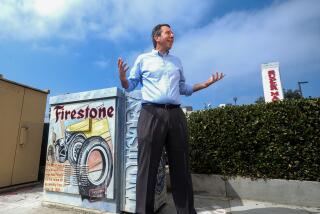Arco Hype May Be Right--Gasoline Can Be Cleaner
- Share via
Everywhere you turn, you encounter the hype: on radio, the basso profundo voice of actor James Earl Jones talking about cleaning up the environment; on television, images of gasoline pumps jutting from the Los Angeles skyline; in newspapers, full-page ads singing the praises of Arco’s new Emission Control-1 gasoline.
For once, the hype may be correct.
Arco says EC-1, designed to replace the leaded regular gasoline used by pre-1975 cars, cuts pollutant emissions from those older cars by 20%. The amount is substantial considering that such cars represent only 15% of all automobiles registered in Southern California but account for 30% of automotive pollution. If all owners of the older cars were to use EC-1, the company promises, “350 tons of pollutants would be removed from the air each day.”
State and local authorities, even environmentalists, agree that the claims are on target. Arco is definitely “ahead of the pack” in reducing auto emissions, said Alan Lloyd, chief scientist of the South Coast Air Quality Management District. “We’ve been trying to get people to do this for years,” added William Kelly, an AQMD spokesman.
Other gasoline companies seem likely to follow suit--if not immediately, at least in the foreseeable future. Already, several refiners have contacted Arco seeking information about the new gasoline, and the company says it will release full details of its manufacture and testing Friday.
The concept of redesigning gasolines to reduce emissions--”reformulating,” in industry jargon--will soon spread to fuels used by newer cars. Within the next year, the California Air Resources Board will mandate that petroleum companies selling in California reformulate all grades of gasoline in a similar fashion to reduce emissions.
And earlier this month, petroleum companies and U.S. auto makers confirmed the formation of a consortium to work toward combining reformulated gasolines with improved engine technology in an effort to avoid government-imposed shifts to alternative fuels, such as methanol, by the mid-1990s.
But even the most enthusiastic supporters of reformulation agree that EC-1 is not a panacea. Arco has the capacity to produce only 36 million gallons per month, all of it destined for use in Southern California. But it is only a fraction of the total needed for the 1.2 million pre-1975 cars and pre-1980 pickup trucks in the region.
For now, the fuel cannot be used in newer cars without using a funnel. The big nozzles on the EC-1 pumps fit only into older cars.
Furthermore, extending the same principle to other gasolines will require at least four years and a substantial capital investment, according to Dan Townsend, Arco’s manager of operations support. The company’s refineries would need to be upgraded, resulting in an increased cost to consumers. For now, the company is selling EC-1 for the same price it charges for leaded regular. Nonetheless, the advent of EC-1 is “a good sign,” according to Mary Nichols of the Natural Resources Defense Council. It shows that the petroleum refiners “can make gasoline a whole lot cleaner.”
Arco created EC-1 by taking three major steps to change its regular gasoline: removing lead, lessening volatility, and reducing the concentration of so-called aromatics and olefins--hydrocarbons that contribute to air pollution and so are themselves health risks.
Volatility refers to the ability of gasoline to evaporate so that it can readily be mixed with air and drawn into the engine for combustion. High volatility promotes good drivability when the car is first started, but it also promotes evaporation of gasoline into the atmosphere when the car is parked, particularly when the engine is warm.
Townsend said Arco was able to reduce the volatility of EC-1 by about 14% without impairing performance, primarily by removing butane, which was used for cold-start drivability. California had already forced refiners to cut butane content below levels in other areas of the country and Arco simply went one step further.
The ARB will require all refiners to meet the volatility level of EC-1 during the 1990s.
Lead compounds represent an inexpensive way to raise the octane of gasoline. Octane is a measure of the energy content of the fuel and the speed with which it burns. High octane is necessary to prevent premature ignition of gasoline, which produces the “pinging” or “knocking” that robs a car of its power and increases pollutant emissions.
Lead compounds already have been removed from about 85% of all gasolines because lead fouls the catalytic converters that reduce exhaust emissions on newer cars. Lead is also a health threat, causing a wide variety of neurological damage, and refiners have slowly been reducing the amount of lead in gasoline for vehicles without catalytic converters.
But without lead, something else must be added to maintain high octane. In the unleadedgasolines now marketed, octane comes primarily from olefins and aromatics. These have a high energy content and they burn slowly so that premature ignition is avoided.
But because they burn slowly, some of the aromatics and olefins escape into the exhaust system, according to Ron Jones of the Washington-based American Petroleum Institute. In cars equipped with catalytic converters, the compounds are generally destroyed. But in older cars, they escape into the atmosphere.
In the skies, the unburned components react with other pollutants to form smog. Some also are health hazards in themselves. One aromatic, benzene, is a carcinogen that is “the No. 1 toxic in Southern California air,” according to ARB spokesman Bill Sessa.
Overall, about one-third of the olefins and aromatics have been removed from EC-1, and about 50% of the benzene.
To replace them, Arco uses a compound called methyl tertiary-butyl ether, or MTBE, an oxygen-containing molecule. Like olefins and aromatics, MTBE has a high energy content and is slow burning. But if it escapes into the air, it does not contribute to smog formation and it has no adverse health effects.
A different gasoline formulation that includes MTBE already is used in high-altitude cities, such as Denver and Phoenix, where the oxygen it contains promotes complete combustion of gasoline during winter.
But it is more costly than olefins and aromatics, raising the manufacturing cost of EC-1 about 2 cents per gallon above the cost of leaded regular. Arco has decided to absorb the extra cost to maintain a competitive pricing position.
Two independent laboratories recently tested the reformulated gasoline in 16 Japanese and American cars from model years 1970 to 1978 and four Japanese and American pickups from model years 1975 to 1979.
The labs found that EC-1 cut evaporative emissions by 21%, carbon monoxide by 9%, nitrogen oxides by 5% and hydrocarbons by 4%, Townsend said. Drivability tests conducted by Arco, he said, also showed that it gave “more power and performance under load” than leaded regular.
The labs have so far tested EC-1 in five new cars as well. Preliminary results indicate, Townsend said, “that this will clean up new cars just as good or better than it did the older cars. “
But, he said, producing a complete line of gasolines like EC-1 will require renovating the refineries, at a cost of at least $100 million apiece. Before Arco makes that kind of investment, Townsend said, it wants to make sure there is not a better formula than EC-1.
Townsend estimated that it would require one to two years to develop the specifications for gasolines to replace the current unleaded fuels, then three years to rebuild the refineries.
Meanwhile, the petroleum and auto companies are planning to test reformulated fuels in 40 new cars over the next year to determine which combinations of fuels and technology produce the lowest emissions. Although some companies may offer their own versions of EC-1 in the near future, changes in gasoline for new cars are unlikely before the end of the trials.
For instance, the chairman of one company, Unocal’s Richard Stegemeier, said, “We don’t plan to do anything drastic until the study is over.”






